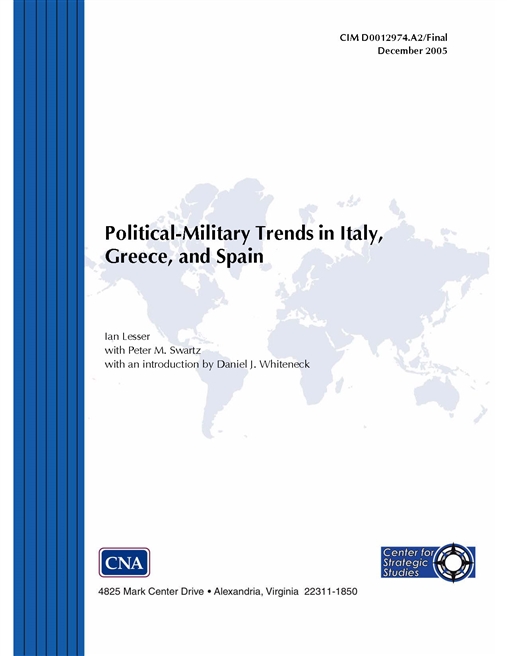The first conclusion we can draw from these papers is that there is a broad agreement among the host nations on the main security challenges facing them in the near future, and that there is enough overlap with U.S. interests to support continued cooperation on AT-FP issues. All three nations face immigration problems from North Africa and other regions to the south and east of Europe. They also have concerns about the security of maritime traffic (crime, proliferation, immigration, drugs) in the Mediterranean. While threats from traditional military sources have diminished since the end of the Cold War, these new threats pose particular problems related to anti-terrorism and the protection of forces and civilians from unconventional means of attack. U.S. attention has also moved south and east from Central Europe, and these challenges are theirs as well for forces and bases in the Mediterranean. This convergence of interests provides a shared threat framework for continued cooperation, not just Navy to Navy, but cooperation cutting across agencies, services, and levels of government.
The second conclusion we can draw from these papers is that coordinated security programs that leverage existing and planned efforts by the host nations (and regional and local authorities) through the EU or NATO will be more favorably received than efforts calling for more AT-FP powers for U.S. forces or strictly bilateral programs between the Navy and the host nation maritime forces. These three host nations, and many other nations in Europe, are looking for solutions to security problems that bolster independent European and national positions rather than a dominant U.S. position.
Third, all of the host nations continue to support the presence of U.S. forces and civilians in their countries. They also support U.S. use of the facilities for presence and power projection missions throughout the Mediterranean and into other areas (such as the Persian Gulf and the Horn of Africa). Through changes of government, and changes in public support for specific U.S. policies, there has been a strong level of consistent support and cooperation between the U.S. Navy and the host nations. Political, military, and economic rationales on both sides remain paramount and underline AT-FP coordination today and can do so into the future.
Lastly, the future of AT-FP cooperation between the Navy and the host nations will occur in a climate partly shaped by the Navy's own actions at shore installations and the actions of its personnel in the host nation. The Navy's capacity to engage diplomatically with local, regional, and national authorities simultaneously (especially within a Europe that provides local and regional governments more autonomy) will be a key to maintaining cooperation. In addition, the Navy will need to be sensitive to the economic, political, and environmental concerns of the host governments, and it will recognize that highly publicized incidents involving Navy personnel may have serious impacts on cooperation.
These papers are important for understanding the larger political foundations of U.S.-host nation relations that underpin the continued presence of U.S. Navy forces in Greece, Italy, and Spain. They serve to remind that cooperative AT-FP policies can be established over the long-term based on the principles outlined below.
Download reportDistribution unlimited. Cleared for Public Release.
Details
- Pages: 64
- Document Number: CIM D0012974.A2
- Publication Date: 12/5/2005
